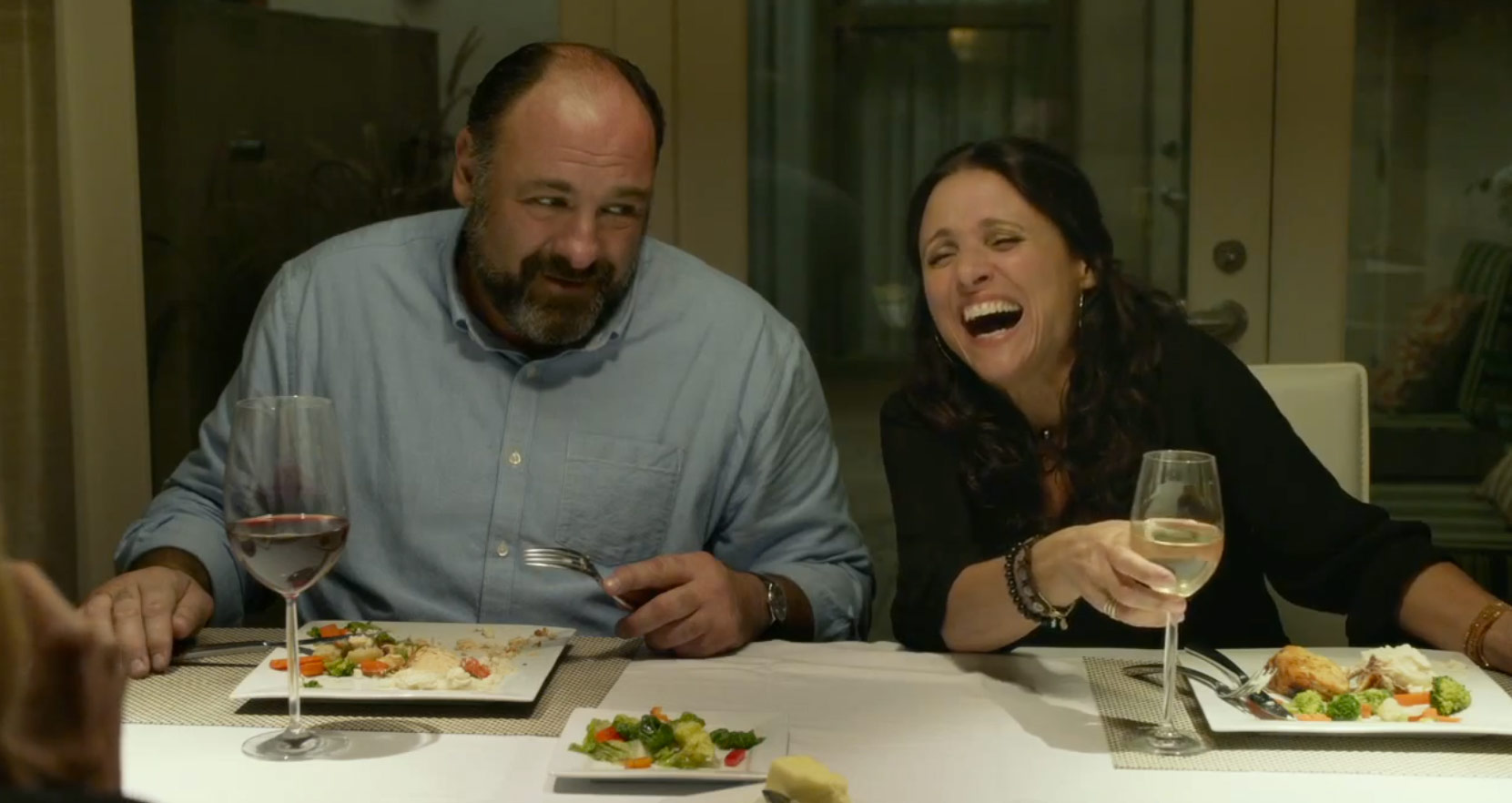“Enough Said” Breaks New Ground

Moving on isn’t easy, and Nicole Holofcener, writer and director of “Enough Said,” doesn’t let us forget it in her story of middle-aged love. Holofcener manages to create a romantic comedy that is at once intelligent, moving and fiercely funny, a rarity in a genre recently dominated by forgettable, formulaic plotlines. “Enough Said” is not escapist entertainment: the fairy-tale love affairs of quirky twenty-somethings have no place in Holofcener’s film. Rather, the characters and their difficulties are refreshingly relatable, even for the college-aged viewer.
“Enough Said” is the story of Eva (Julia Louis-Dreyfus), a Los Angeles-based massage therapist, offbeat museum curator Albert (James Gandolfini) and the development of their somewhat unusual romance. Eva is several years removed from a divorce and her 18-year-old daughter (Tracey Fairaway, who gives a wonderfully understated and touching performance) is preparing to leave for college: Eva decides it’s time to jump back into the dating pool. Albert, also a divorced parent of a daughter (Eve Hewson) readying for her freshman year, has made the same decision. They meet at a cocktail party hosted by a mutual friend. When introduced, both claim that they don’t find anyone at the party attractive. However, they’re intrigued by their similar stations in life — middle aged divorcées with children heading to the east coast for school — and agree to a no-pressure first date. Though hesitant at first, they begin to see each other regularly and start to truly enjoy spending time together. Their senses of humor are completely compatible! Neither is on good terms with his or her ex! Both are acutely self-conscious about their aging bodies! Everything is going to work out perfectly!
But then it doesn’t. Eva cultivates a new friendship with the bohemian New Age poet Marianne (the perfectly wacky Catherine Keener) all while deepening her romantic relationship with Albert. Marianne has quite a few problems of her own and she opens up to Eva with complaints about her own repulsive, obnoxious, good-for-nothing ex-husband. Marianne describes her former husband’s offensive eating habits in one of “Enough Said”’s funniest scenes: the way he ate guacamole, mixing it all around with a tortilla chip to get rid of the onions — he hated onions — that was a deal breaker, she laments. Eva laughs at this and her free-spirited friend’s other melodramatic stories until she sees Albert with his chip-laden hand stuck in the guacamole bowl, avoiding the offensive ingredient. Albert — charmingly funny, witty, kind of-overweight Albert — is Marianne’s ex-husband. This, of course, complicates Eva’s relationship with Albert. Eva struggles with the information that Marianne had unknowingly provided. Her vision of Albert as a goofy, warm, a-little-sloppy-but-still-sexy guy is clouded by Marianne’s memories of him as boring and loserish. To her, he was never sexy — just bad at sex. Eva tries to correct Albert’s “faults,” which had never been apparent to her before, to the detriment of their relationship. Holofcener’s chronicle of these strained relationships never drags, thanks to a script with snappy, witty dialogue and a secondary plot with Eva’s daughter Ellen and Ellen’s super-needy best friend Chloe (Tavi Gevinson, who effectively plays a boy-crazy teen girl who’s just a little too clingy).
Holofcener highlights the motif of moving on throughout “Enough Said,” and it has implications within the film and without it. Both Eva, Albert, and Marianne need to learn to move on from their ex-husbands and wives and the bad taste their divorces left in their mouths. This is essential, Holofcener suggests, to cultivate fulfilling new romances. How can Eva and Albert settle into life as a couple if they’re so focused on what went wrong in their first marriages? How can Eva love Albert is she obsesses over the flaws the overly theatrical Marianne plants into her head? All three of them are about to become empty nesters: their only children are traveling across the country to start as freshman at college. Both the daughters of “Enough Said” and their parents must move on to their new lives: Tess (Albert and Marianne’s daughter) and Ellen as university students, and Albert, Marianne and Eva as independent adults without children to care for.
The viewers of the film, too, must move on: Gandolfini’s performance in this film is all the more poignant because it was one of his last. The actor passed away due to a heart attack this past June, and after watching this film, it is clear that he still had much to offer as a performer. In addition, both James Gandolfini and Julia Louis-Dreyfus are well known as television actors who played iconic characters: Gandolfini as Tony Soprano of “The Sopranos” and Louis-Dreyfus as “Seinfeld”’s Elaine Benes. It is difficult to watch the film without thinking of these roles, but Gandolfini and Dreyfus are fantastic in that they embody Eva and Albert without exuding even a hint of their previous television parts. “Enough Said” is no “Sopranos”-“Seinfeld” hybrid, and devotees of either show may be disappointed for that reason. Nicole Holofcener’s film can be appreciated for what it is: a very witty look at the difficulties that come along with close relationships, new and old. The sharp dialogue and sensitive performances (especially Gandolfini’s) make the film a must-see.